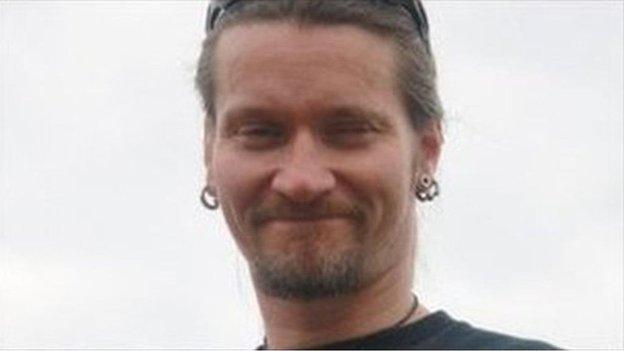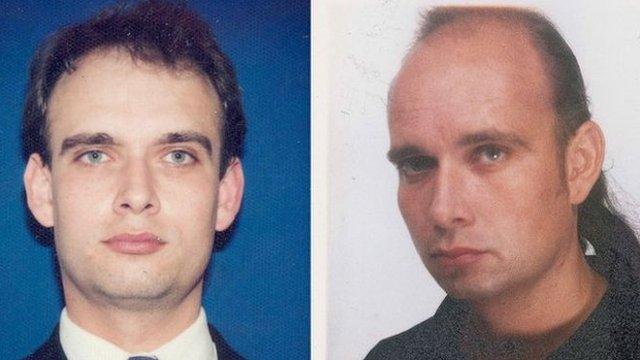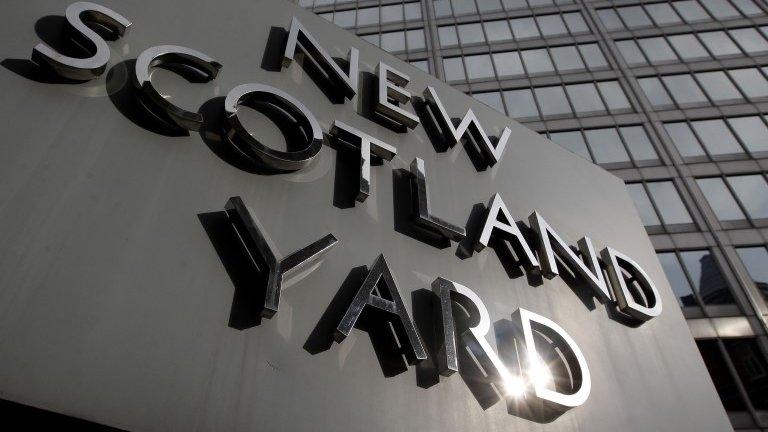Undercover police practices 'could have led to unsafe convictions'
- Published

In 2012, a series of convictions which stemmed from actions of undercover officer Mark Kennedy were overturned
More than 80 activists who were investigated by undercover officers could have been victims of miscarriages of justice, a report has concluded, external.
However, its author Mark Ellison QC said police failure to keep records on undercover work could make it difficult to prove what role it played.
His conclusions come as the home secretary set out terms for a public inquiry into undercover policing.
Mr Ellison said the activists' cases should be reviewed within the inquiry.
The report, led by barrister Mr Ellison, who previously conducted a review of the role of undercover policing in the Stephen Lawrence murder case, external, looked at the practices of undercover officers who infiltrated protest groups in the 70s, 80s, and 90s.
Some had lengthy personal and sexual relationships with their targets - and even had children with them.
Lack of records
Mr Ellison found 83 cases that potentially involved the work of undercover officers where there was a "spectrum of behaviour of concern to the safety of convictions" - however, no decisions have been made about whether the cases should be referred back to the courts.
The lack of records - and the scale of the work required - meant the possibility of unsafe convictions should now be considered by the public inquiry into undercover policing, he concluded.
This inquiry will be headed by Lord Justice Pitchford, who will examine the motivation for, and the scope of, undercover police operations and their effect upon individuals and the public.
Mr Ellison's report said that 26 officers working for the Special Demonstration Squad (SDS) - a branch of the Metropolitan Police which infiltrated protest groups including animal rights activists and far right organisations - were arrested on 53 occasions.
There were nine occasions when the officers were "in role" and with activists who were also arrested.
The inquiry has been examining whether undercover officers might have had evidence which should have been disclosed to courts where activists were being prosecuted, resulting in their acquittal.
However, this review concluded that "the SDS regarded its activity as outside any of the prosecution disclosure obligations".
Only in "a very small number of cases" was the involvement of an undercover officer revealed.

Analysis by Dominic Casciani, home affairs correspondent
There have been revelations of undercover relationships, the use of the names of dead children to create false identities, monitoring of MPs, infiltration of the Stephen Lawrence family campaign and, now, the possibility of the largest miscarriage of justice in modern times.
Given the seriousness of the allegations - and the inevitable challenges in getting to the bottom of part of what went on in the murky world of undercover operations, there is an enormous amount at stake.
Campaigners closest to the allegations have been broadly supportive of the inquiry's terms of reference - although there are some reservations - and they are now focused on the detail of one very important element of the procedures.
They want Lord Justice Pitchford to resist any attempts by the Metropolitan Police or other forces to avoid full public disclosure of what went on - including any possible attempts to keep officers anonymous or to adopt the legal position of neither confirming nor denying what went on.

'Black operation'
One detective inspector said in the 1990s: "We were part of a 'black operation' that absolutely no one knew about and only the police had actually agreed was all okay."
BBC home affairs correspondent Tom Symonds said the lack of records may mean convicted activists involved in protest groups during the period, and even later, may never know if their convictions are unsafe.
Often the undercover officers would be arrested alongside protestors at demonstrations and face trial, unknown to anyone in the court system, he said.
The Special Demonstrations Squad did not keep proper paper records on purpose, and Crown Prosecution Service files only begin in 1986 when the organisation was created.
This means that investigators from Operation Herne are struggling to determine whether undercover officers behaved as "agent provocateurs" and encouraged protestors into actions they would not have otherwise taken.

Peter Francis: transformed his appearance as he went deep undercover
Former SDS undercover officer Peter Francis, who has made a string of disclosures about undercover work - including detailing alleged infiltration of the Stephen Lawrence family campaign and monitoring of Labour MPs - welcomed the inquiry.
He said he wanted to "speak openly, under oath, not hidden behind a screen and without the fear of being prosecuted" about his time undercover.
Police Spies Out of Lives, a campaign group backing women taking legal action against police chiefs after unknowingly having relationships with undercover officers, said the inquiry must tackle "all aspects of the complete disregard shown for human rights".
National Police Chiefs' Council said it would cooperate with the public inquiry into undercover policing, but said "it should be remembered that undercover policing has and continues to protect the public from our most dangerous criminals".
In 2012, the Court of Appeal overturned a series of convictions as a result of the actions of Mark Kennedy, an undercover officer.
He had taken part in a protest at Drax power station in Yorkshire which led to a number of offences taking place.
- Published12 March 2015

- Published25 March 2015
- Published24 October 2014